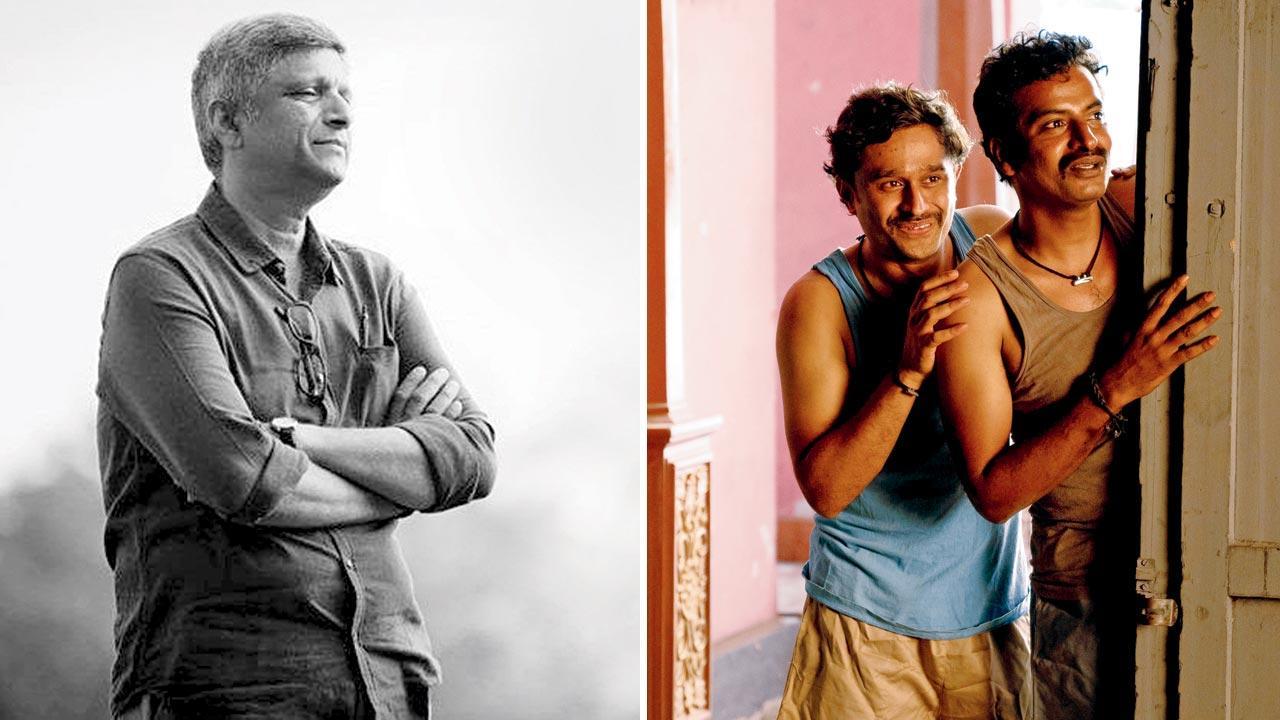Madhyantara, shot on 16-mm film and winner of two National Awards, is a nostalgic ode to Kannada cinema’s golden era even as it shines a light on the unseen history of labour in the Indian industry

Dinesh Shenoy; (right) Madhyantara, which Shenoy refers to as “Act I” of a three-part longer feature project that he plans to make, is about two movie lovers enraptured by the charms of the big screen who work their way up the film industry
I don't know anyone else who at 10 was buying copies of Roopatara,” filmmaker Dinesh Shenoy, son of Konkani cultural icon Basti Vaman Shenoy, tells us when we ask him if the heroes of his Kannada short film Madhyantara—movie lovers enraptured by the charms of the big screen who work their way up the film industry—are versions of him.
ADVERTISEMENT
Growing up in Bantwal, Shimoga and Chikkamagaluru in Karnataka in the early 1970s, Shenoy would often borrow money from his parents to travel to towns with cinema halls to watch Kannada films. He remembers poring over cinema listings in the newspapers each Friday, devouring every word printed in film magazines such as Roopatara and Vijayachitra, and even buying cinema tickets at black market rates.
“I was always in awe [of the medium]. The memories of watching those films are still in my conscience. And I always knew that I was watching them differently from other people. I was not just a movie buff. When people ask me about when I started pre-production for Madhyantara, I jokingly tell them that I started 45 years ago. The research began in my childhood,” says the 56-year-old filmmaker, who though based in Delhi, continues to nurture strong connections with his home state.
Like his protagonists, Shenoy started his career as a light boy and has worked in the industry for nearly 27 years in various capacities as cinematographer, line producer and production assistant.
Madhyantara, which garnered two National Awards (Best Debut Director and Best Editor for veteran Suresh Urs) last month, grew out of a story related by producer RF Manikchand in an interview of how, while growing up, since he couldn’t afford the ticket price of 50 paisa, he and a friend would share a movie ticket, each watching one half of it and later summarising its incidents to the other.
Shenoy stumbled upon this interview in late 2020 when, confined by the pandemic, he got into the habit of watching interviews of yesteryear Kannada actors and film industry professionals. “The moment he said the line, I knew I had to do something with it,” recalls Shenoy. Combing through more interviews, reading books on Kannada films (“I read more Kannada than English”) and making several research trips to Bengaluru in search of people and vintage equipment helped him give shape to the short film which he also envisioned as an unconventional pitch for a possible feature-length project.
The National Award has come as validation and enabled more appointments with producers, the director told us when we met him after a screening of the film in Mangaluru.
Madhyantara is shot on celluloid which lends it a beautiful grainy quality perfectly suited to its time period and the sense of nostalgia the film centres on. The idea to shoot on 16-mm film was proposed by executive producer Ganesh Shetty who also worked on director Raam Reddy’s magic realist film The Fable, also shot on 16-mm film.
Both the camera and 22 cans of film, Shenoy tells us, were borrowed from Reddy for the shoot of Madhyantara. Shot using traditional frames, reflective of both the innocence of the medium as well as that of its two central characters, the film weaves fiction with snippets of film history—audiences gaping at the screen as Anant Nag glides in a helicopter in the song Elliruve and jiving to the cult classic If you come today from Operation Diamond Racket, and glimpses of Kannada screen icons Dr Rajkumar and Ambareesh on film sets. The film’s main characters, the director shares, are inspired by the staff of an eatery that his aunt’s family ran in Chikkamagaluru whose workers, being dedicated film buffs, routinely fashioned their own lives on latest film trends.
Given that the film captures their ascent through the hierarchies of film production from light boys to assistant directors, Madhyantara also shines a light on the existent social order, relations and practices on a film set and pays tribute to the unseen history of labour in Indian cinema.
“You need the help of hundreds of people who work in different departments,” admits Shenoy. “Since I started my career as a light boy and focus puller, I have been through all of its stages. That’s why I think I gathered the courage to direct the film.”
 Subscribe today by clicking the link and stay updated with the latest news!" Click here!
Subscribe today by clicking the link and stay updated with the latest news!" Click here!







